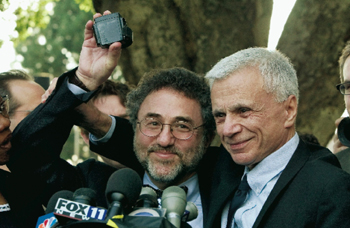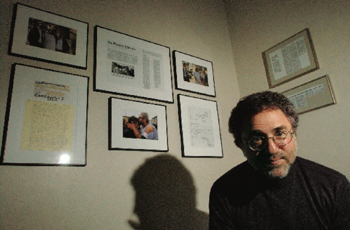ROBERT BLAKE’S NEW BEST FRIEND
by Lessley Anderson, San Francisco Magazine, July 2005
How did an earnest Bay Area lawyer come to like bullyboy Robert Blake—much less get him off for murder? By Lessley Anderson.
 One day last February, Susan Schwartzbach sat in the back office of a Van Nuys, California, rental property doing something she’d done more times than she cares to remember: waiting for her husband. Every so often, the brown-haired British-born woman glanced up from her book and peered out the window. She could see into the main house, which was separated from the back office by a swimming pool. Her husband, M. Gerald Schwartzbach, was inside sitting on a couch, deep in conversation with Robert Blake.
One day last February, Susan Schwartzbach sat in the back office of a Van Nuys, California, rental property doing something she’d done more times than she cares to remember: waiting for her husband. Every so often, the brown-haired British-born woman glanced up from her book and peered out the window. She could see into the main house, which was separated from the back office by a swimming pool. Her husband, M. Gerald Schwartzbach, was inside sitting on a couch, deep in conversation with Robert Blake.
Just a few hours before, Susan and Gerry (as his friends call him) had been savoring the last moments of a rare vacation. A slight 60-year-old criminal defense attorney, Schwartzbach has a hard time relaxing. After a week in Palm Springs, he’d finally succeeded in doing so, and the couple was preparing for a leisurely drive back home to Mill Valley.
A few days earlier, Schwartzbach had checked his work voice mail and received a surprising message. A lawyer working for Blake said that the actor wanted to meet with him, so Schwartzbach and his wife were planning to stop in Van Nuys, where Blake lived, on their way home.
“All I knew about Robert was what I’d read in the papers,” says Schwartzbach, a soft-spoken man with a self-deprecating sense of humor. Blake was the trash-talking loose cannon, not so far removed, in his public image anyway, from the tough-guy cop he played on the TV series Baretta. Schwartzbach had watched the actor play Mickey on The Little Rascals when he was a kid and knew that Blake had recently been charged with murdering his wife, Bonny Lee Bakley. He’d also heard that Blake had already blown through three lead defense attorneys, the latest being Tom Mesereau, who went on to defend Michael Jackson.
 Schwartzbach was far from the obvious choice to represent Blake, a fact he freely admits. The low-key attorney had never tried a case in Los Angeles and knew very few people there. “I didn’t even know who he was before the Blake trial,” says former O.J. Simpson “Dream Team” attorney Robert Shapiro. And Blake was hardly Schwartzbach’s usual type of client. More typical for him was the San Francisco man charged with running a gay prostitution ring whom he defended in the late seventies. On his first visit to the man in jail, he knew what he was in for.
Schwartzbach was far from the obvious choice to represent Blake, a fact he freely admits. The low-key attorney had never tried a case in Los Angeles and knew very few people there. “I didn’t even know who he was before the Blake trial,” says former O.J. Simpson “Dream Team” attorney Robert Shapiro. And Blake was hardly Schwartzbach’s usual type of client. More typical for him was the San Francisco man charged with running a gay prostitution ring whom he defended in the late seventies. On his first visit to the man in jail, he knew what he was in for.
“Bad breath is one thing. But when you combine bad breath with bad body odor and bad facts, it’s not real attractive,” says Schwartzbach. “But I caught myself and said, ‘Well, if I don’t represent him, who will?’ Just because your client may be a jerk or factually guilty doesn’t mean you can walk away.” Another classic example was the 1981 trial of Delores Churchill, a battered wife charged with the attempted murder of her abusive husband, who was a police officer. Schwartzbach got her off by helping to pioneer the “battered women syndrome” defense. It was considered a groundbreaking case but didn’t help the defense attorney pay the bills.
Indeed, while Schwartzbach’s hard-won victories for the poor and the unglamorous have earned him a stellar reputation in Bay Area legal circles, they haven’t brought in the big bucks, which is one reason he was attracted to the Blake case. Not only could he use the money, but he saw it as a chance to do something good for his family, who had paid a price for his principled career. His wife had put her own photography career on hold to help Schwartzbach on his cases, which often took him away from the family for weeks at a time, and he had missed significant chunks of his son Micah’s middle school years. Micah, now 24, remembers one emblematic Father’s Day. He was in college, and his dad had been working for years appealing the case of Glen “Buddy” Nickerson, who was serving a life sentence for murder and was eventually exonerated (see “Innocence Lost,” November 2004), thanks to Schwartzbach’s efforts. A deadline in the case was approaching, so Micah and his mom spent the entire day in Kinko’s copying thousands of pages of exhibits on their own dime. Micah didn’t particularly resent it—“it’s just kind of funny that the one day you’re supposed to sit back and appreciate your dad, he’s in there working his tail off, and you’re right there with him”— but still, Schwartzbach felt bad.
And there’s another reason Schwartzbach wanted to take Blake’s case. He passionately believes everybody has the right to a fair trial, and on those grounds alone, he probably would have defended the actor. But when he left the meeting that day, it wasn’t the money or the prestige Schwartzbach was thinking about; it was the man himself.
“When I first met him, he wasn’t the crude, abrasive guy a lot of people think he is,” Schwartzbach says. “He was an aging, physically and emotionally frail man. There was a tenderness and a gentleness to him in the warm way he greeted Susan, and when we began to talk, he looked me straight in the eye. We had a connection.”
But perhaps the clincher for Schwartzbach was that after hearing Blake’s story, he was convinced the actor was innocent. That certainly wasn’t the majority opinion. In fact, when the defense polled prospective jurors, at least 75 percent said they thought Blake had done it. On the face of it, he sure looked guilty. For one thing, everyone knew there was no love lost between Blake and Bakley—and there were two witnesses who claimed Blake hired them to kill her. Also, Blake was the last to see Bakley alive and the first to find her dead, shot in the car where she was waiting for him a block and a half from the Italian restaurant where they’d just had dinner. Blake’s bizarre-sounding alibi was that he’d gone back inside the eatery to retrieve a gun he carried and had forgotten under the table—and it wasn’t the same gun that killed his wife. But while nobody saw him shoot Bakley, nobody saw him come back inside the restaurant, either.
But Schwartzbach wasn’t buying it, and, in fact, it’s his penchant for digging into a case that probably got him the job to begin with. He’s no Johnnie Cochran, and his trial skills don’t lie in flashy performances or witness badgering. Rather, he’s known for his dogged, meticulous research. Schwartzbach will scour the evidence for little flaws and inconsistencies other lawyers might miss and is a master at raising the specter of reasonable doubt in the minds of a jury. Under his courteous, warm demeanor lies a man who will go to masochistic lengths to prepare for battle—and fight to win.
“The way he defends his clients, he’s like one of those horses you put the blinders on, stick ’em into the chute, and they’re off,” jokes Jacqueline Tully, a private investigator who worked with Schwartzbach on Blake’s case and others. “He drives himself and everybody around him crazy.”
“With Gerry, it’s preparation with a capital P,” says Stephen Bingham, the radical lawyer and civil rights activist who, thanks to Schwartzbach, was acquitted in 1986 of one conspiracy charge and multiple murder charges stemming from an incident in which he’d allegedly smuggled a gun into San Quentin. The prosecution claimed the weapon was used later by the Black Panther George Jackson in an escape attempt that left six people dead, including Jackson.
In an issue relating to the conspiracy charge, bullets had been found in another inmate’s cell, which is where Schwartzbach’s doggedness came in. A justice department criminalist testified that the bullets could be inserted into a pipe to make a zip gun, and just for kicks, Schwartzbach tested it prior to trial and found it didn’t work. Then, on cross-examination, he asked the criminalist to demonstrate the gun. The man struggled to fit the bullets inside the pipe until he was forced to admit he couldn’t do it, and the prosecution’s case took a major hit.
“It sent the message to the jury that just because somebody is in law enforcement and has credentials and says they’re a scientist, you can’t take what they say at face value,” says Schwartzbach. Schwartzbach’s doggedness is one reason his name came to the fore when Blake was scouting around for a new lead counsel and asked one of his junior attorneys to call Forensic Analytical, the Hayward, California–based crime lab that was doing work on Blake’s case. When the call came in, chief forensic scientist Chuck Morton couldn’t say enough good things about Schwartzbach. “I’d worked with him on past cases, and he’s outstanding,” Morton says. Indeed, Schwartzbach’s relentless urge to dig is what eventually turned the Blake case around. The prosecution’s star witnesses, stuntmen Gary McLarty and Ronald “Duffy” Hambleton, claimed Blake had offered them money to kill Bakley, and when each refused, the prosecution theorized, the actor did it himself. But Schwartzbach found plenty of reason for doubt. To begin with, there was no physical evidence connecting Blake to the fatal shooting. No fibers, hair, or fingerprints belonging to him were found on the gun that killed Bakley, which was recovered in a dumpster next to the car. Also, the prosecution’s two star witnesses were no Boy Scouts, and Schwartzbach set out to prove that. He hired a team of three other lawyers, two support staff, and two investigators and amassed evidence that both had serious drug problems and should not be believed. His team tracked down two old friends of Hambleton’s, now clean and sober, who testified they’d seen the stuntman do methamphetamine. One of them also claimed to have seen Hambleton make the drug. The jury also heard how, in 1999, Hambleton had phoned 911 and said there were some armed men on his property trying to kill him. San Bernardino County sheriff’s deputies and a helicopter rushed to the scene prepared for war, only to find one man—Hambleton— brandishing a rifle.
Schwartzbach put an expert on the stand who testified that speed can cause paranoia and delusions. Indeed, the defense subpoenaed medical records from McLarty’s cardiologist, which revealed that the stuntman’s recent heart attack may have been caused by his persistent cocaine use. “When I saw the records, I nearly had a heart attack myself!” says Schwartzbach.
The revelations about the witnesses were bolstered by the fact that right before Blake’s trial, McLarty checked into a psychiatric ward after suffering severe hallucinations. More damaging yet was the fact that McLarty’s estranged wife and adult son testified that Blake actually hadn’t asked Gary McLarty to kill Bakley (though he supposedly told the opposite to the National Enquirer). Rather, they said McLarty had told them that the actor had asked him to “punch out some guys” who had been bothering his wife. The facts of the case aside, Schwartzbach’s other advantage was his easy-going manner with the jurors. He spoke in a quiet voice and cracked lots of jokes, frequently at his own expense. The atmosphere in the courtroom was very friendly, according to Tully.
Behind the scenes, however, things weren’t so upbeat. Before trial, Schwartzbach’s Los Angeles rental was broken into, and his computer, with important information relating to the case, was stolen. He lived apart from his wife for an entire year and rarely saw her. “Even when you’re with him, you can tell his mind is somewhere else,” says Susan. “It was an extremely difficult time for both of us.” And Schwartzbach’s health was beginning to suffer. At one point during the trial, he passed a kidney stone and was diagnosed with exhaustion—and eventually he began to get piercing cramps in his legs and feet. It became a daily ritual for Blake, who was under house arrest, to ease the pain in his lawyer’s lower extremities. “We joked that here he is, a celebrity, on his hands and knees in the parking garage under the courthouse massaging my feet!” says Schwartzbach with a laugh.
When the verdict was read, Susan and Micah watched it on TV, clinging to each other and crying with joy. In the courtroom, Blake also broke down in loud sobs and embraced his lawyer. Schwartzbach felt something between elation and numbness, relieved it was finally over. But it wasn’t entirely—and may never be—since many people still think Blake is guilty. Shortly after the trial, Schwartzbach gave a speech to a group of lawyers in Southern California, and one put the question directly: “If Blake didn’t do it, who did?” Schwartzbach was polite but firm in his response. “It’s not my job to find out who did it,” he told the man. “It was my job to show that the prosecution didn’t prove that Robert did it beyond a reasonable doubt.”
Has Blake’s case opened new doors for Schwartzbach? “I’ve gotten some calls from L.A., but... ” (He shrugs, as if to say, “No way am I going back down there again anytime soon.”) At the moment, he’s defending three clients. The first two are not particularly high profile, but the other, a 27-year-old Stockton man, is charged with cultivation and possession of marijuana and illegal possession of firearms. The man, Aaron Paradiso, has a medical marijuana prescription. But he couldn’t use the guns, which were registered to his mother, even if he wanted to. He’s paralyzed from the neck down. “Don’t they have any crime to investigate in Stockton?” asks Schwartzbach.
As for future work, Schwartzbach says he’s committed to finding more well-heeled clients. The Blake case helped him financially, but he needs more like it to make him really comfortable. Would he defend somebody like Ken Lay? You bet, he says. After all, he believes in everybody’s right to a fair trial, and a multimillion dollar retainer would mean he would be able to take the occasional case for free. Susan would be able to pick up her photography career again, and the couple could take trips together and enjoy their later years.
But it’s not so simple. One recent afternoon, there are three letters sitting on Schwartzbach’s desk unopened. He knows just by looking at the longhand return addresses that they’re from prisoners. He picks them up and fans them out like a bad hand of cards. “They think ‘Schwartzbach’ translated into English means ‘Robin Hood,’ ” says Schwartzbach, grimacing. “That I’ll work for free, right every wrong.” He places the letters neatly in the middle of his desk without opening them. His face is sad as he does it. It won’t be easy for Schwartzbach to be a celebrity lawyer.
Lessley Anderson is a freelance writer living in San Francisco.





